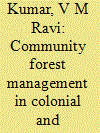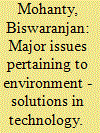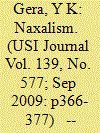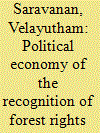| Srl | Item |
| 1 |
ID:
117602


|
|
|
|
|
| Publication |
2012.
|
| Summary/Abstract |
In the past two decades, South Asia has undergone robust reforms in the forestry sector which claim to be initiating a transformation from state-centric to people-centric forest management. This shift is perceived as an important move towards decolonisation in governance processes in India. Examining the forest policies in colonial and postcolonial South India, this article finds, however, that community forest management in postcolonial India remains substantially rooted in the colonial framework of forest resource management policies. In practice, this means that exploitation of forests gives some consideration to the requirements of forest-dependent communities today, but does so now under the control of a state that fails to protect the most basic rights of many of its most vulnerable citizens. The article thus argues critically that supposedly people-centric community forest management in India is not sensitive enough to local development needs, nor indeed sufficiently protective of the basic needs of many forest-dependent people.
|
|
|
|
|
|
|
|
|
|
|
|
|
|
|
|
| 2 |
ID:
163234


|
|
|
|
|
| Summary/Abstract |
This paper reviews the emerging effects of the 2012 decision of the Constitutional Court of Indonesia relating to the customary management of Indonesia's traditional forests. It focuses on the challenge of moving from legal to political and societal recognition of Indigenous peoples’ rights. In its advocacy of customary land rights, Aliansi Masyarakat Adat Nusantara (AMAN) successfully applied to the Constitutional Court for judicial review of the Forest Law 41 1999. It argued the law breached the constitutional rights of its members in permitting the state to permit exploitation and development rights over traditional forest without their consent. The flow‐on effect of allocating such rights included widespread deforestation and land use change without agreement from customary communities that have used and occupied these forests for centuries, thus ignoring traditional customary law that regards these forests as the property of such communities. The paper reflects critically on international experience in the interface between legal recognition of Indigenous peoples’ rights, and their translation into sustainable and meaningful societal transformation.
|
|
|
|
|
|
|
|
|
|
|
|
|
|
|
|
| 3 |
ID:
120952


|
|
|
| 4 |
ID:
091684


|
|
|
| 5 |
ID:
091729


|
|
|
|
|
| Publication |
2009.
|
| Summary/Abstract |
Politics has played havoc with tribals and the environment during the post-Independence period in India. Even after fi fty years of Indian planning, deprived groups, and tribals in particular, continue to remain underdeveloped, with their living conditions deteriorating further. Taking a historical perspective, this article seeks to capture the political undercurrents of economic policy-making towards tribals and tribal development planning and specifi cally analyses the consequences of the Scheduled Tribes and Other Traditional Forest Dwellers (Recognition of Forest Rights) Act of 2006 on the environment as well as tribal development. Examining whether this new, politically motivated law will provide an impetus for economic progress of the tribals and environmental sustainability, it is argued that this Act will neither benefit the tribal communities nor enhance conservation. Rather, it serves as a cloak to justify non-tribal intervention, with potentially disastrous consequences.
|
|
|
|
|
|
|
|
|
|
|
|
|
|
|
|